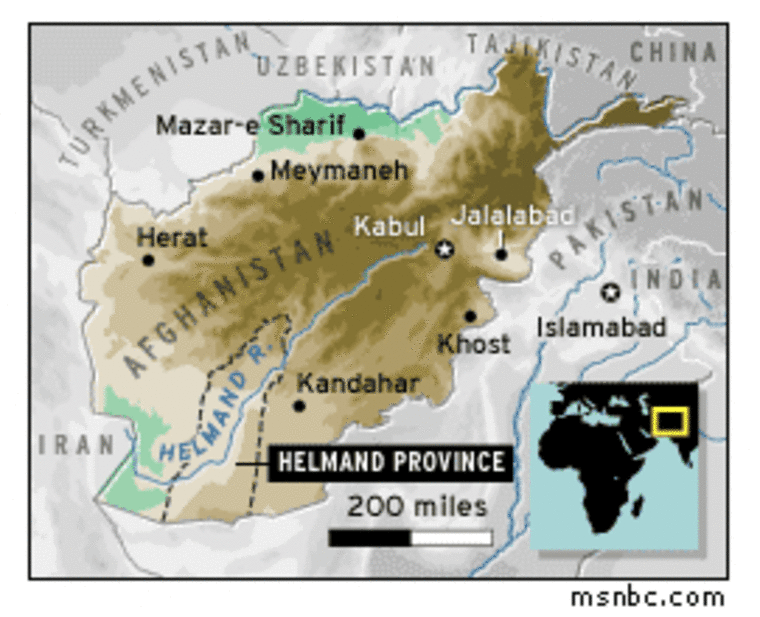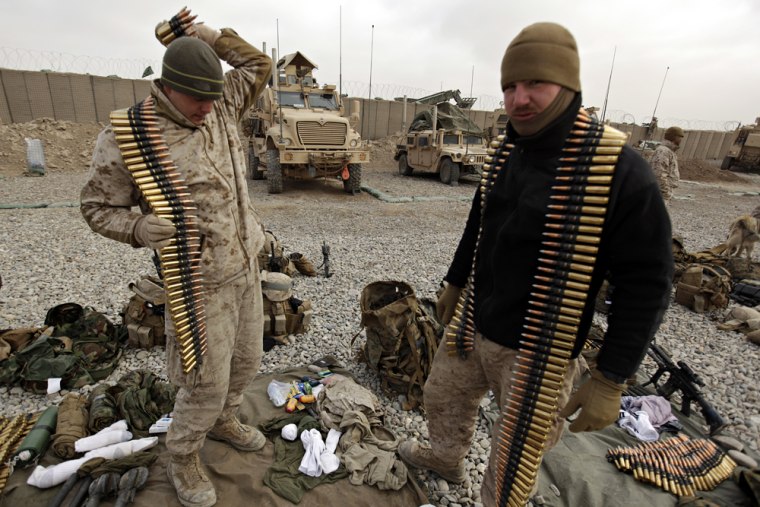Taliban fighters plan to disguise themselves as civilians during a looming NATO offensive in southern Afghanistan, a militant commander told NBC News.
Minivans piled high with mattresses and clothing lined up at checkpoints Sunday as hundreds of civilians fled a Taliban-controlled area in Helmand province.
The U.S. military has not given a start date for the operation to clear insurgents from the town of Marjah, the biggest community in the south under insurgent control. But the military has said fighting will start soon and many residents weren't taking any chances.
The militants, meanwhile, dug in for a fight, reinforcing their positions with rocket-propelled grenades and heavy weapons, according to witnesses.
'We will shake their hands'
But a Taliban commander told NBC News' Richard Engel that many insurgents would wait out the offensive.
"What, they will walk down empty streets?” the militant leader asked. "They (U.S. and coalition troops) will come in and announce that they have conquered the area. We will let them come in. They are welcome.
"They will ask, 'Are there any Taliban in the area?' We will say, 'Yes, but they have left'," the Taliban leader added.
"We will not fight them face-to-face," he said. "We will shake their hands, as civilians. Then they will leave."
The U.S. military has often had trouble identifying Taliban militants when they attempt to blend into the local population.
The insurgent leader said the insurgents specialize in “guerrilla tactics” and have no intention of confronting the U.S. military head-on.
“Maybe there will be some bombs for them, or a few suicide bombers will blow up among them, but we will not fight directly,” the Taliban commander said.
On Sunday, American aircraft dropped leaflets over Marjah warning people of the coming offensive, officers said, and the U.S. fired illumination rounds after sundown, apparently to help spot Taliban positions.
Villagers said the leaflets were aimed primarily at the militants, listing several of their commanders by name and warning fighters to leave the area or be killed.
U.S. Gen. Stanley McChrystal, the top NATO commander in Afghanistan, said the success of the operation depends on convincing civilians that the government will improve services once the militants are gone.
The offensive in Marjah — a farming community and major opium-production center with a population of 80,000 — will be the first since President Barack Obama announced he was sending 30,000 additional troops.

Afghan President Hamid Karzai discussed the on-going operations in Helmand province in a telephone conversation Sunday with British Prime Minister Gordon Brown, a spokesperson for Brown said.
The spokesperson said they "welcomed the leading role" played by Afghan Security Forces in preparing for the offensive, stressing that "Afghan leadership was fundamental to the success of the operation."
Drug traffickers
U.S. officials have long telegraphed their intention to seize Marjah. McChrystal said the element of surprise was not as important as letting citizens know that an Afghan government will be there to replace Taliban overlords and drug traffickers.
"We're trying to create a situation where we communicate to them that when the government re-establishes security, they'll have choices," McChrystal told reporters Sunday.
The International Committee of the Red Cross said there was no way to count the number of people who have left Marjah because many have moved in with relatives or rented houses in nearby towns instead of registering for emergency relief.
Ghulam Farooq Noorzai, the head of the provincial refugee department, estimated that 90 to 100 families had left the Marjah area because of concerns about the operation. Afghan families have an average of six members, according to private relief groups.
Refugee officials held an emergency meeting last week and decided to stockpile food and erect five big tents on a school compound in the nearby provincial capital Lashkar Gah to accommodate any influx, he said.
'Everybody is worried'
Mohammad Hakim, a 55-year-old tribal leader in Marjah, said fear has risen over the past two weeks and he knows at least 20 families who had left. He himself planned to take his wife, nine sons, four daughters and grandchildren to live with relatives in Lashkar Gah.
"Everybody is worried that they'll get caught in the middle when this operation starts," he said in a telephone interview.
Hakim said he was worried about the length of the operation.
"I can stay for one or two weeks," he said. "But if I have to leave my agriculture land for months and months, then how will I feed my family?"
Afghan and NATO officers had visited village elders to encourage them to make sure people stay inside their homes and avoid road travel once the operation starts.
The Taliban were not preventing villagers from leaving but were digging trenches and carrying in new heavy weapons on motorbikes.
Many people were afraid to leave their fields and brave the bad winter roads, villagers said.
Ghulan Nabi, a wheat and poppy farmer with seven children in Marjah, said his family planned to leave soon and wait out the offensive in a nearby district.
"We have a good house, a nice life, but now I will have to rent a home," he said. "But we want peace and security. We don't care who comes here. We just want peace in our village."
Deputy police chief arrested
If the U.S. and NATO strategy is to succeed in Afghanistan, they also need to train Afghan government forces to take over their own security so the international troops can eventually withdraw. But relations between foreign and Afghan forces have often been uneasy.
In a sign of those strains, NATO-led forces said Sunday they had arrested a deputy provincial police chief they accused of helping insurgents place roadside bombs north of Kabul.
Officials in Kapisa province defended Attaullah Wahab, saying he was an honest and good officer.
NATO said Wahab was arrested Friday in the Kapisa provincial capital of Mahmud-i-Raqi for involvement in the storage, distribution and planting of roadside bombs as well as corruption related to road reconstruction.
